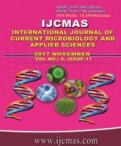


 National Academy of Agricultural Sciences (NAAS)
National Academy of Agricultural Sciences (NAAS)

|
PRINT ISSN : 2319-7692
Online ISSN : 2319-7706 Issues : 12 per year Publisher : Excellent Publishers Email : editorijcmas@gmail.com / submit@ijcmas.com Editor-in-chief: Dr.M.Prakash Index Copernicus ICV 2018: 95.39 NAAS RATING 2020: 5.38 |
Wilt pathogen Fusarium oxysporum f. spricini caused severe declines in yield of Castor (Ricinus communis L.) crop. To control the castor wilt disease, mostly fungicides are used and consequent fungicides impact undesirable toxic effect on the environment. To minimize the pollution impact, development of alternative ecofriendly strategies is needed. Therefore, to fill these knowledge gaps, native and commercial bioagents were evaluated for their efficacy on the wilt pathogen, by in vitro bioassay. Fourteen bioagents, include seven fungal and seven bacterial bioagents were tested by dual culture method. The isolates Trichoderma viride (DOR Tv), T. harzianum (DOR Th) and commercial isolates T. viride (Trichogen-T) and T. viride (Bhoomika) significantly inhibited wilt pathogen growth by 100.00 percent. While the bacterial commercial bioagent Florozen-P (Pseudomonas fluorescens) showed maximum inhibition by 85.69 per cent, followed by B. subtilis by 81.11 per cent compared to the others. In current study both the native and commercial fungal and bacterial bioagents showed a significant antagonistic ability to wilt pathogen. However, fungal bioagents performed better over bacterial isolates. In addition, bacterial bioagents, the commercial talk formulations performed better over others. In conclusion, indicating potentiality of biocontrol based protection as a sustainable alternative for the management of castor wilt.
 |
 |
 |
 |
 |